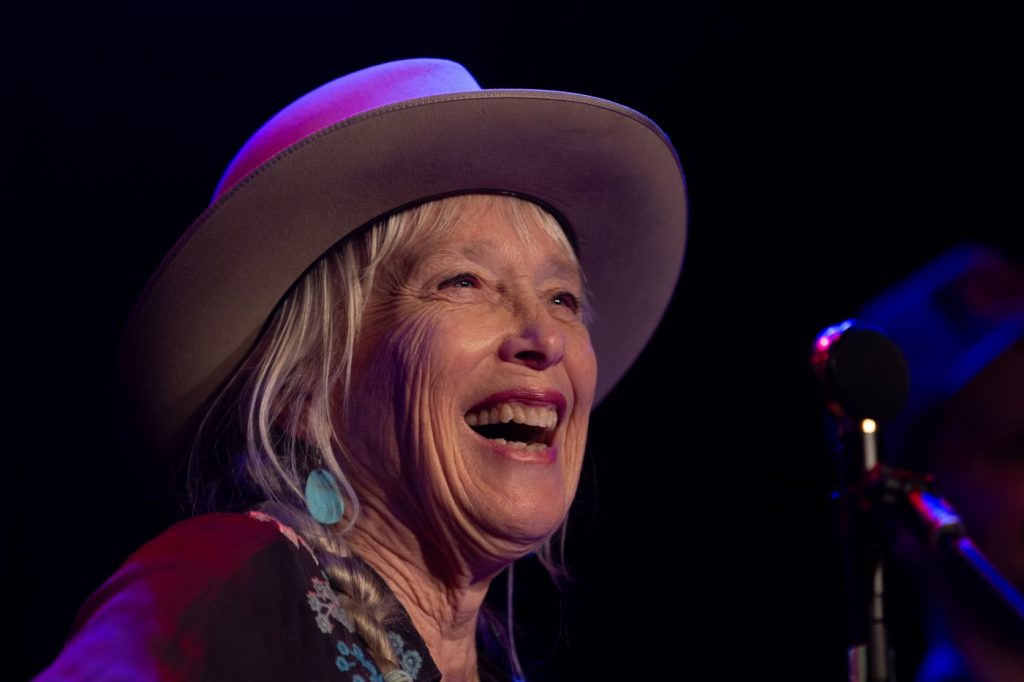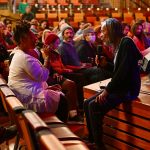The Bay Area’s vibrant acoustic music scene in the 1960s and 1970s helped make Berkeley’s Laurie Lewis, who grew up learning classical piano and violin, a bona fide bluegrass star and an inspiration to young local musicians who’ve followed in her footsteps.
Bluegrass festivals seeded fan communities far beyond rural Appalachia, where the string band musical style was popularized by Grand Ole Opry star Bill Monroe. But there was something about the Bay Area that made it easy for someone like Lewis, with no background in a musical style mostly performed by men, to fit right in.
“It wasn’t until I started touring nationally that I realized what an oasis this place was and what a good place for me to get into the music, because it was completely acceptable,” Lewis recalled over coffee at Way Station Brew, one of her favorite Berkeley cafes. “If you loved the music, you should play it.”
Bluegrass star Laurie Lewis leads her Right Hand Band—Brandon Godman on fiddle, Hasee Ciaccio on bass, George Guthrie on banjo— Friday, March 8, 2024, at the Sweetwater Music Hall in Sausalito, Calif. (Karl Mondon/Bay Area News Group)
As an “older statesperson” of the Bay Area bluegrass and roots music scene now, Lewis can point to a number of local musicians who’ve followed in her footsteps, many of whom she’s helped along the way, and signs that the region continues to provide opportunities for budding traditional musicians.
Two of bluegrass’ biggest new stars are Bay Area women — Molly Tuttle and AJ Lee. San Francisco’s free Hardly Strictly Bluegrass Festival, now in its 23rd year, showcases the music not often heard on commercial radio. And new young talent like the East Bay’s Crying Uncle, who hone their skills at local and regional music festivals, cafes, farmers markets and other venues, are driving interest among the region’s kids.
But Lewis also worries the region’s astronomical cost of living makes it much harder to make it as a musician now and to sustain an acoustic music community.
Attending the Berkeley Folk Music Festival for the first time as a teenager was an awakening for Lewis, whose father was a classical flutist.
Bluegrass star Laurie Lewis performs with her Right Hand Band, Friday, March 8, 2024, at the Sweetwater Music Hall in Sausalito, Calif. (Karl Mondon/Bay Area News Group)
“We just had classical music going all the time,” Lewis recalled. “But that really opened my ears to traditional music, folk music, of all stripes.”
Her father arranged for her to take banjo lessons from a student at UC Berkeley, who let her explore his bluegrass record collection — at a time when most teens were grooving to Jefferson Airplane, the Grateful Dead and Creedence Clearwater Revival.
Lewis drifted away from music and explored modern dance while attending classes at UC Berkeley, but the break didn’t last long. She soon discovered there was a vibrant bluegrass and acoustic music scene centered at a pub in San Francisco called Paul’s Saloon with music every night, including a jam night where “where people would just get together and play.”
Lewis found several things set the Bay Area music scene apart even then. “It was less people trying to outplay each other with their hot licks and more just playing together in the service of the music,” Lewis said.
And while there were women stars, bluegrass and folk were still male dominated on the national scene. Not so here: “When I started playing bluegrass at Paul’s Saloon, the first two bands I saw had women, and I just thought that’s the way it is.”
Lewis had joined The Phantoms of the Opry as a bass player, but when it disbanded, Lewis cofounded one of the first all-women bluegrass bands — the Good Old Persons — whose other members included Kathy Kallick.
Bluegrass star Laurie Lewis leads her Right Hand Band—Brandon Godman on fiddle, Hasee Ciaccio on bass, George Guthrie on banjo— Friday, March 8, 2024, at the Sweetwater Music Hall in Sausalito, Calif. (Karl Mondon/Bay Area News Group)
Playing music at bars, pizza parlors and other small venues was never great money, but it was enough to get by in those days. There also were mid-sized venues, like the old Freight and Salvage, where more serious local groups could build their audience as opening acts. The Freight moved to a larger, $12 million venue in 2009 with expanded capacity to accommodate the growing interest in acoustic music, but Lewis said in the process, the region lost a venue suitable for developing musicians, something she hopes will be remedied soon.
“You’re either playing for 12 people in a bar or 400 people — you need something else,” Lewis said.
Lewis was fortunate to buy a house years ago with a small inheritance, which she says “has been my life raft and what’s enabled me to stay and play music here.” Of her current band The Right Hands, only fiddler Brandon Godwin, originally from Kentucky, lives locally in San Francisco. Bassist Hasee Ciaccio is based in North Carolina and banjoist George Guthrie in Nashville.
“Nashville has been the big place that’s been sucking all the young people away. It’s a great scene there, and people are getting together and jamming all the time,” Lewis said. “That’s what this place was like in the 1970s.”
In addition to making and performing music — she has a new album out and joined with former bandmate Kathy Kallick for a Berkeley Bluegrass Festival performance — Lewis also helps support other musicians. She teaches music camps at the California Bluegrass Association’s annual Father’s Day Bluegrass Festival in Grass Valley and offers musical river-rafting trips. Her RiverWonderGrass trip this June on the Yampa River already is sold out, and she’s doing Bluegrass on Whitewater on the Rogue River in September.
In spite of the challenges facing budding bluegrassers in pricey Northern California, Lewis is inspired by the young talent that somehow finds a way. Tuttle, with whom she’s collaborated musically, has called Lewis “one of my earliest heroes and influences.” And emerging bluegrass star Daisy Caire of Placerville has said Lewis “made my musical dreams come true.”
“I think it’s having a little revival right now. I just hope that it catches on and can make enough money for enough people that they can figure out how to stay here,” Lewis said. “You need young people. . . I love the music and I’m happy to be a part of it. And to be seen as still relevant in that scene is a blessing.”


